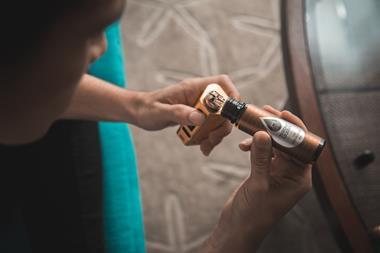Over the coming months, convenience retailers can expect a flurry of students looking to pre-book work experience placements, following the government's decision to introduce the Diploma in Retail Business in September 2010.
The qualification will be taught across 42 partnerships of schools, colleges and training organisations and will see 14-19 year-olds combine classroom study with retail-based learning and workplace experience.
But contrary to popular belief, taking on work experience candidates is no longer just a case of getting someone to help tidy the baskets and face up shelves. If retailers want students to seriously consider the convenience sector as a career, then they need to provide a proper insight into how the business works.
A number of retailers are already reaping the benefits of offering work experience students a more detailed insight into the world of retail and so could you.
Andrew Newton, who owns a Nisa Local in Brierley Hill, West Midlands likes to give his work experience students a variety of interesting tasks. "I usually have the kids for five days," he says. "They do all sorts from helping check off deliveries, to joining me on cash and carry trips. I also show them how to work the tills, so that they have experience in handling money."
Students are also a regular feature at Grewal's Budgens, in Chorleywood, Rickmansworth. "We have both school and college kids coming for work experience," says owner Vic Grewal.
While Vic welcomes students, he interviews them first to make sure they are serious about the project. "We like to meet them before we take them on to make sure they're not going to mess around, and try them out for a couple of days before we agree to a placement," he says.
When students do arrive on Vic's shopfloor he insists their experience isn't all about stacking shelves and sweeping the floor. He believes students need to get involved in the business side of convenience retail, too.
Vic allows his work experience candidates to help out in the back office. "I have one student who comes in at weekends and helps out with the accounts looking at taxes and VAT it's great practice," he says.
Anne Seaman, chief executive of Skillsmart Retail, adds that by challenging and inspiring work experience candidates, retailers are changing people's perception of the convenience industry. "Getting young people involved in work experience is essential for retail as it gives us an opportunity to give people a positive insight into the sector and encourages students to see it as a career of choice," she says.
"However, if it is going to work, retailers need to make it a good experience for the students. It doesn't do anyone any good having bored students getting in the way or being given menial tasks."
Instead, she believes that retailers need to plan their placements to ensure that they make the right impression. "I would encourage retailers to think about how they can get the most out of work experience and how they can give students a real glimpse of the exciting world of retail. In return, they will get motivated young workers who boost productivity while they are on their placements and who will become the potential workforce of the future."
One man who has really embraced the idea is Nisa retailer Kishor Patel, who owns eight stores in Bedfordshire and Hertfordshire. Every year he runs between six and 12 work placements, ranging in length from one to two weeks, and each is booked up about six months in advance.
He explains that giving students a more thorough experience of the workplace encourages them to really get excited about retail. "The kids end up discussing their placement when they go back to school and the bigger the impact we make on them, the more interested in retail they will become," he says.
As well as learning about good customer service and how to operate the tills, Kishor gives the students a taste of how the IT and payroll systems work, as well as health and safety training.
"It's quite easy now that I've designed a template to work through," says Kishor. This includes a checklist of all the areas that students are to be educated about, and a glossary of business terms that students are provided with to help them gain a better understanding of the industry.
"We don't look at work experience as cheap labour they aren't just there to make the tea," he adds. "It's much more of a long-term investment than that. We've actually had a couple of people apply to work for us permanently after completing a placement."
And if you are considering offering work placements, then there's no time like the present. "Now is a good time to start thinking about work experience because there are going to be more and more opportunities for retailers to get involved in working with young people," says Seaman.
"In the coming years all young people will be legally required to stay in education or training up to the age of 18, and new programmes such as the Diploma in Retail Business have been designed specifically for the sector so there is a lot of scope for retailers to get involved."
The qualification will be taught across 42 partnerships of schools, colleges and training organisations and will see 14-19 year-olds combine classroom study with retail-based learning and workplace experience.
But contrary to popular belief, taking on work experience candidates is no longer just a case of getting someone to help tidy the baskets and face up shelves. If retailers want students to seriously consider the convenience sector as a career, then they need to provide a proper insight into how the business works.
A number of retailers are already reaping the benefits of offering work experience students a more detailed insight into the world of retail and so could you.
Andrew Newton, who owns a Nisa Local in Brierley Hill, West Midlands likes to give his work experience students a variety of interesting tasks. "I usually have the kids for five days," he says. "They do all sorts from helping check off deliveries, to joining me on cash and carry trips. I also show them how to work the tills, so that they have experience in handling money."
Students are also a regular feature at Grewal's Budgens, in Chorleywood, Rickmansworth. "We have both school and college kids coming for work experience," says owner Vic Grewal.
While Vic welcomes students, he interviews them first to make sure they are serious about the project. "We like to meet them before we take them on to make sure they're not going to mess around, and try them out for a couple of days before we agree to a placement," he says.
When students do arrive on Vic's shopfloor he insists their experience isn't all about stacking shelves and sweeping the floor. He believes students need to get involved in the business side of convenience retail, too.
Vic allows his work experience candidates to help out in the back office. "I have one student who comes in at weekends and helps out with the accounts looking at taxes and VAT it's great practice," he says.
Anne Seaman, chief executive of Skillsmart Retail, adds that by challenging and inspiring work experience candidates, retailers are changing people's perception of the convenience industry. "Getting young people involved in work experience is essential for retail as it gives us an opportunity to give people a positive insight into the sector and encourages students to see it as a career of choice," she says.
"However, if it is going to work, retailers need to make it a good experience for the students. It doesn't do anyone any good having bored students getting in the way or being given menial tasks."
Instead, she believes that retailers need to plan their placements to ensure that they make the right impression. "I would encourage retailers to think about how they can get the most out of work experience and how they can give students a real glimpse of the exciting world of retail. In return, they will get motivated young workers who boost productivity while they are on their placements and who will become the potential workforce of the future."
One man who has really embraced the idea is Nisa retailer Kishor Patel, who owns eight stores in Bedfordshire and Hertfordshire. Every year he runs between six and 12 work placements, ranging in length from one to two weeks, and each is booked up about six months in advance.
He explains that giving students a more thorough experience of the workplace encourages them to really get excited about retail. "The kids end up discussing their placement when they go back to school and the bigger the impact we make on them, the more interested in retail they will become," he says.
As well as learning about good customer service and how to operate the tills, Kishor gives the students a taste of how the IT and payroll systems work, as well as health and safety training.
"It's quite easy now that I've designed a template to work through," says Kishor. This includes a checklist of all the areas that students are to be educated about, and a glossary of business terms that students are provided with to help them gain a better understanding of the industry.
"We don't look at work experience as cheap labour they aren't just there to make the tea," he adds. "It's much more of a long-term investment than that. We've actually had a couple of people apply to work for us permanently after completing a placement."
And if you are considering offering work placements, then there's no time like the present. "Now is a good time to start thinking about work experience because there are going to be more and more opportunities for retailers to get involved in working with young people," says Seaman.
"In the coming years all young people will be legally required to stay in education or training up to the age of 18, and new programmes such as the Diploma in Retail Business have been designed specifically for the sector so there is a lot of scope for retailers to get involved."






















No comments yet